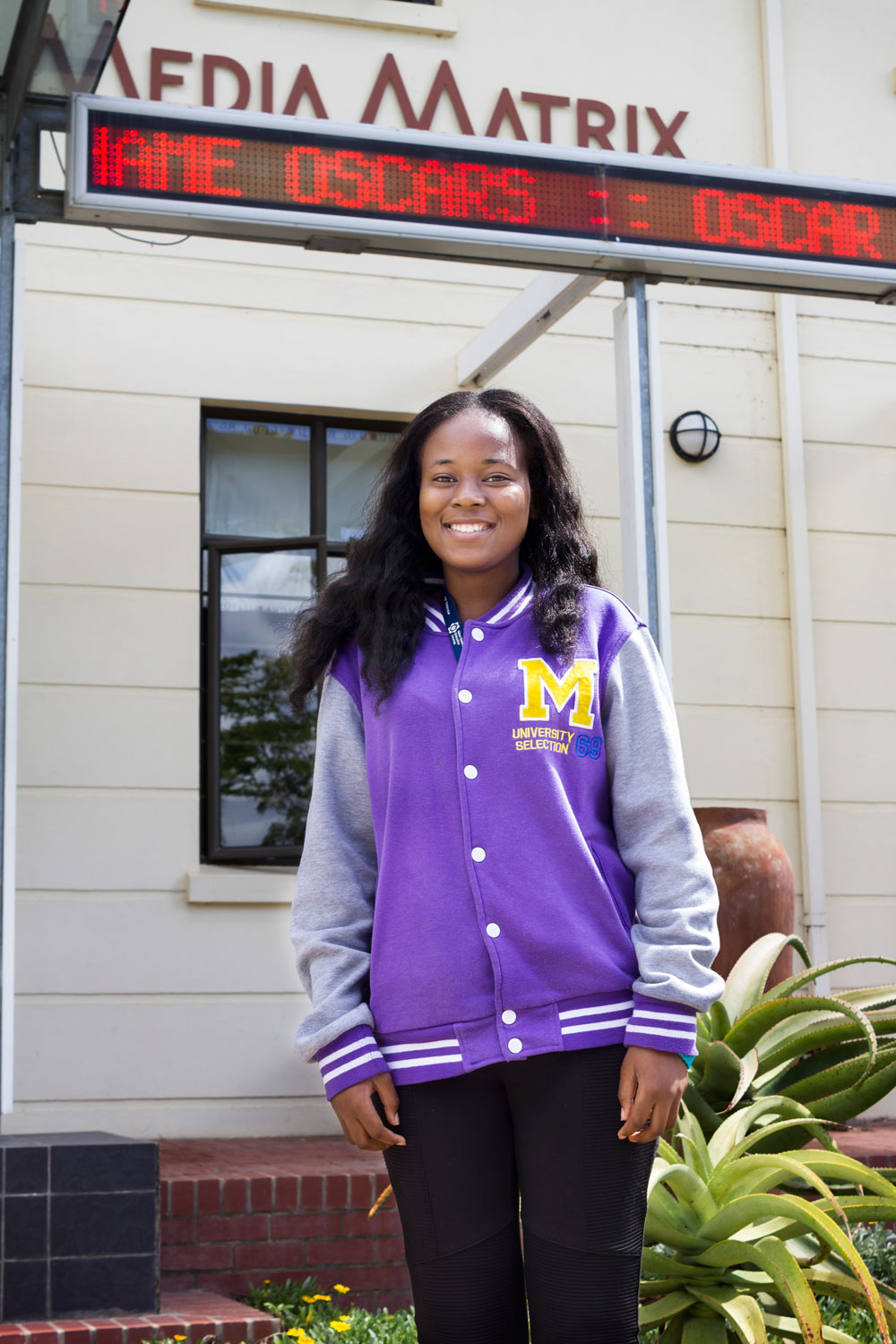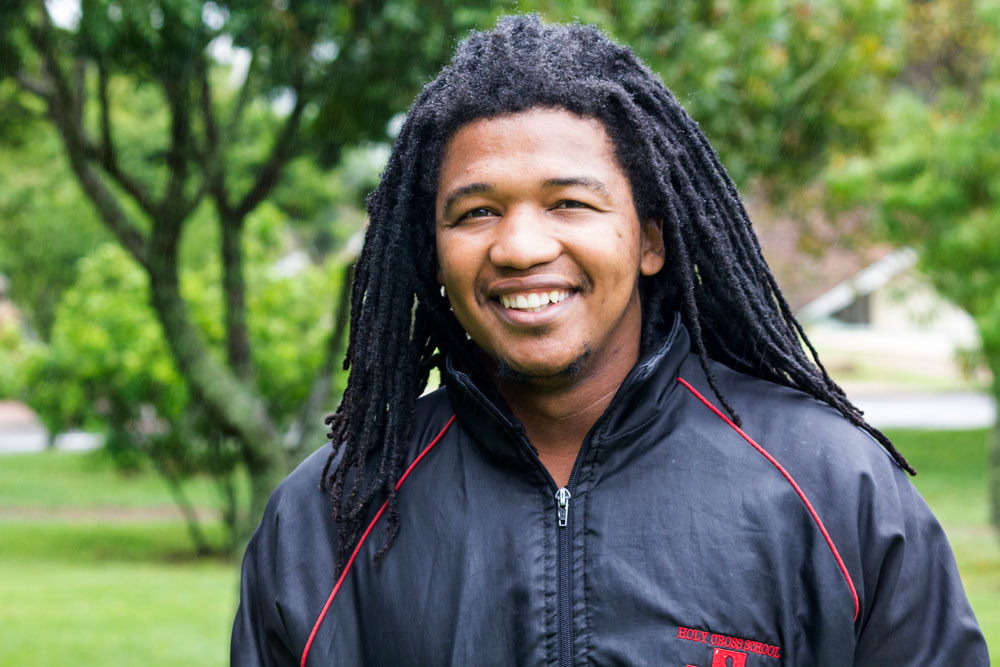Marian Jayes
It’s not bells and whistles that have resulted in Grahamstown’s GADRA matric school (GMS) becoming the second-biggest feeder school of students to Rhodes University. It’s just good, old-fashioned teaching, sound management and an ethos of love and discipline.
“The teachers are the best, I’m not just saying that,” Athenkosi Nzanzeka, first year Rhodes journalism student and GMS graduate told the Mail & Guardian. “They engage with the parents. They care. Even when I was away at hospital they called me all the time, checking how I am. Even when I came back they made sure I had transport to and from school.”
The 20-year-old school, which caters for financially and educationally disadvantaged youth, also produced 52 bachelor passes last year. GADRA stands for Grahamstown Area Distress Relief Association.
Nzanzeka matriculated in 2012 from a Johannesburg school with a diploma pass. She didn’t get the marks she wanted for the same reasons as many disadvantaged pupils – family responsibilities and household chores.
“I grew up in Joza township in Grahamstown, but in high school I went to live with my aunt in Johannesburg who needed help looking after her baby … there were lots of household chores and I didn’t have time to focus on my books,” Nzanzeka said.
“It didn’t help either that there were 40 pupils in my class so individual attention was not easy to come by.”
Overcoming hurdles
She knew she would have to improve her marks if she was going to get into Rhodes University in her hometown, so she joined GMS in 2013. But she met another hurdle when severely high blood pressure caused her to lose her eyesight temporarily in April. She was in and out of hospital until late July.

Athenkosi Nzanzeka is now in her first year at Rhdoes University studying journalism. (Michelle Cunliffe)
GMS teachers rallied round and gave her extra lessons and “attention like a parent [would]”, she said.
“It was an unhappy time but then I saw I was doing better. I understood things that I didn’t understand at school.” Being accepted to study at Rhodes was a shock, she said.
“I had a dream but I thought, ‘no man, it’s too big’.”
Success stories like these have resulted in GMS becoming the second-biggest feeder school into Rhodes, GMS manager Ashley Westaway, told the M&G. The biggest is Victoria Girls High School in Grahamstown.
“By the end of October, 25 members of the Class of 2014 had been offered places at Rhodes in 2015”, said Westaway, while others went on to study at other universities.
Last year’s figure of 52 bachelor passes looks set to rise further if the 2014 trial exams marks are anything to go by; pupils produced marks equivalent to 81 Bachelor passes.
“If one looks at performance in this regard over the past three years, GMS has produced half of all working class black bachelor passes in Grahamstown. Put another way, GMS produces the same number of Bachelor passes as all the local township schools combined.”
He said the standard of Eastern Cape education was “very low” and the fact that GMS produces the results that it does, “at a cost per learner that is lower than the cost of public education, after a learner has been subjected to twelve years of public school, is an indictment on the Eastern Cape Provincial Department of Education”.
The school’s reputation precedes it and this year it received 520 applications from pupils who had either failed outright or received low passes. It only had capacity for 140 of them.
Back to basics
It owes its success to “focusing on the basics”, Westaway said.
“We don’t do anything particularly innovative in terms of resources. We offer good, old-fashioned teaching, good management and an ethos of love and care.”
“Although all of the teachers are employed on a part-time basis, each of them is a subject matter specialist, a qualified teacher and a person who is passionate about the youth of Grahamstown and the Eastern Cape.”
He said it was “remarkable” that the school, which runs on donations from big business and individuals, “has more teachers with masters degrees than some of the ultra-exclusive and very expensive private schools in Grahamstown”.
The Eastern Cape city of Grahamstown might be small but it is a bustling education hub, with its university being ranked in what is known as the top five universities in South Africa. Its many educational establishments range from wealthy private schools like St Andrew’s and DSG, to public schools that constitute an education district that performed the third worst in the province in the 2013 matric exams, Westaway said.
Fees at GMS are worked out according to what pupils’ families can afford.
“The lowest fee we charged for this year was R3 200 but in the event that a pupil doesn’t pay, we don’t chase them away. If they can’t afford to pay then they don’t,” said Westaway.
He said corporates, trusts, foundations, and individual donations were responsible for paying teacher salaries and keeping the school running.
Expectations
Gcobisa Mjele got a bachelor pass when she matriculated in 2012 from Mary Waters High School in Grahamstown but she did not have enough points to get into Rhodes so she spent the following year at GMS.
“From the beginning of the year [teachers and management] tell you what they can offer and what they expect from you,” she said. “They will meet you halfway. If you put in the effort then they are more than willing to go the extra mile for you. They help us with applying to universities, and we have kept in touch with our mentors.” She is now in her first year studying a bachelor of arts in law at Rhodes.

Gcobisa Mjele is a GMS graduate and a first year law student at Rhodes university.
Ntsika Kitsili is an old-time GMS graduate who is now teaching pupils in the way he wished he had been taught. He matriculated in 2004 at a school where the facilities were adequate but “we had to share textbooks and teachers not trained well enough to teach all learning styles or all capabilities”.
He matriculated with a straight pass but after spending a year at GMS he, got enough points to be accepted into Rhodes’ bridging course and then its journalism degree.
“My family was not poverty-stricken but my home environment was not conducive to studying. Our house was crowded. There were about 11 of us in a three-bedroom house. There was no space to study and you felt guilty asking for things like stationery and new trousers for school.”
It was the close attention at GMS that helped him succeed.

Ntsika Kitsili is a GMS graduate. He completed his studies at Rhodes and is now a teacher. (All photos by Michelle Cunliffe)
“I was called each and every term for an interview with the principal. They give you such close attention. At my school no one took time to help me reflect how I did in the previous term. Those little things motivated me,” he said.
After completing his course he did a post-graduate certificate in education and now, aged 29, he teaches at Holy Cross School outside Grahamstown.
“It was the most amazing feeling getting into Rhodes. It was so surreal. Besides the excitement, it changed that perception for me that your background doesn’t have to determine where you end up in life.”